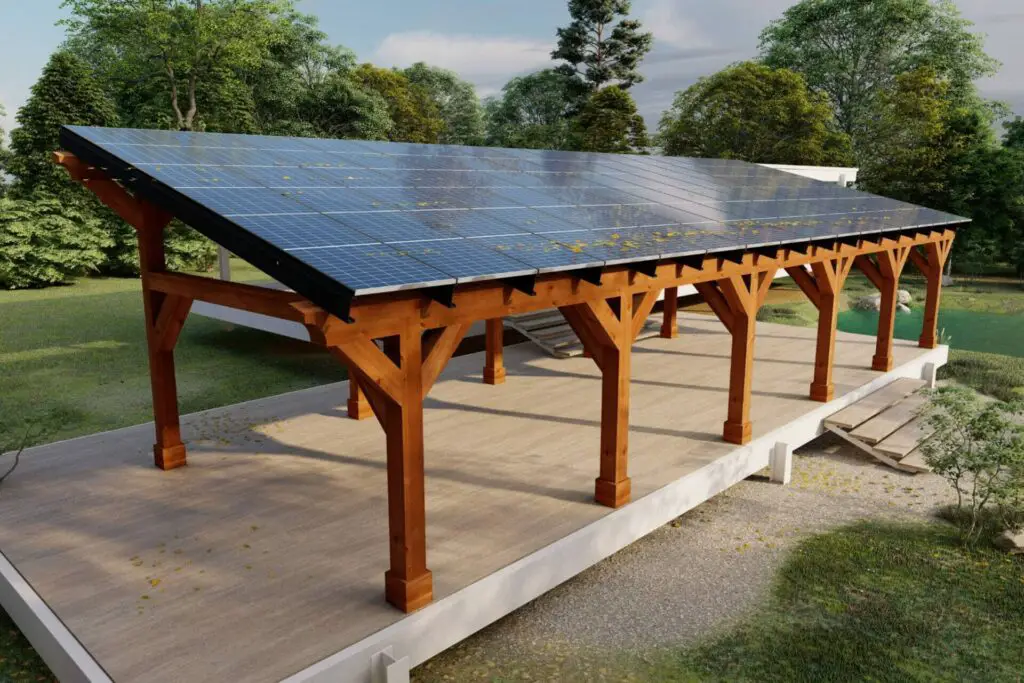Solar panels on rooftops are often the first image that springs to mind when considering home solar power. However, there are several other viable locations to harness solar energy for your residence.
In 2023, ground-mounted solar panels and solar carports gained traction as popular alternatives. You can also explore solar structures for patios or gardens, commonly known as ‘solar pergolas’ or ‘solar gazebos’. One of the most commonly asked questions in this situation is: “Can I put solar panels on a gazebo?”
The answer is yes, you can put solar panels on a gazebo. By placing solar panels on the roof or structure of the gazebo, you can use the energy of the sun to operate outdoor devices and activities.
Proper assessment of the gazebo’s location, structural integrity, and integration of panels with the design are crucial factors to consider for a successful installation of solar panels on Gazebo.
Understanding Gazebos And Their Structure
Gazebos are freestanding, open-sided structures in gardens, parks, or outdoor spaces.
They serve as a sheltered area for relaxation, social gatherings, or outdoor events.
Gazebos come in various shapes and sizes, such as octagonal, rectangular, or round, and are often constructed from wood, metal, or vinyl.
The structure typically consists of a roof supported by columns or posts, providing shade and protection from the elements.
Some gazebos may have additional features such as railings, screens, or curtains for privacy and aesthetics.
Understanding the design and structure of gazebos is essential for various purposes, including determining the feasibility of solar panel installation.
What Limitations Or Challenges Exist When Installing Solar Panels On A Gazebo?
Installing solar panels on a gazebo may pose a few limitations and challenges.
The size and design of the gazebo may limit the available space for solar panel placement.
The gazebo’s orientation and shading could also affect the solar panels’ efficiency.
Ensure proper wiring and connections to the electrical system.
In addition, you need to consider the solar panels’ weight to ensure that the gazebo remains structurally strong and stable.
What Is The Required Space On A Gazebo For Installing Solar Panels?
The space required for installing solar panels on a gazebo depends on several factors.
Generally, you’ll need enough unobstructed surface area on the gazebo’s roof to accommodate the desired number and size of solar panels.
The exact space requirement varies based on the wattage and dimensions of the panels you intend to install.
It’s advisable to consult with a solar installation professional who can assess your gazebo’s specifications and provide accurate guidance on the space needed for optimal solar panel installation.
Does Installing Solar Panels Impact The Structural Integrity Of A Gazebo?
Installing solar panels on a gazebo generally does not significantly affect its structural integrity.
The additional weight of the solar panels should be within the load-bearing capacity of the gazebo’s structure.
Professional installation and proper mounting techniques are crucial to attach the panels securely.
If you have any doubts or worries about the durability and safety of the gazebo’s construction, it is advisable to consult with a structural engineer or an experienced installer.
Do Solar Panels On A Gazebo Produce Sufficient Electricity For My Requirements?
The electricity generation capacity of solar panels on a gazebo depends on several factors.
This involves considering factors such as the size of the solar panel setup, the availability of sunlight, and your specific energy requirements.
While solar panels on a gazebo may generate significant electricity, it is unlikely to meet all your energy needs, especially for larger households.
However, they can reduce electricity consumption and provide a supplementary power source.
What Maintenance Is Required For Solar Panels Installed On A Gazebo?
Solar panels installed on a gazebo necessitate routine maintenance to guarantee their top performance and lifespan.
Over time, factors such as dust, leaves, bird droppings, or other types of debris can pile up on the solar panels, leading to reduced efficiency.
Therefore, it’s crucial to clean them regularly.
In most instances, a basic rinse using a garden hose is enough.
However, it may be necessary to use a soft brush or even hire a professional cleaning service for more stubborn grime.
Furthermore, inspecting and maintaining the mounting system and connections is important.
This ensures the solar panels remain secure and stable, preventing potential accidents or damage.








